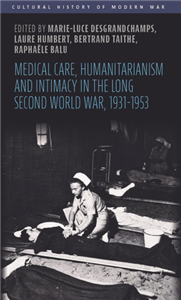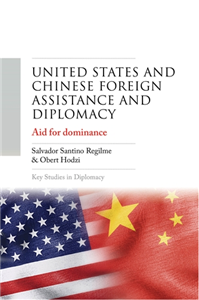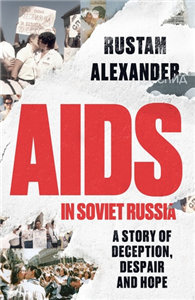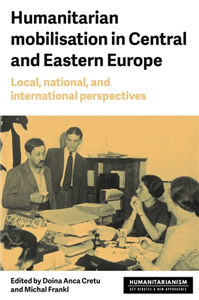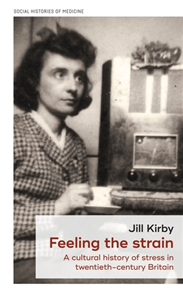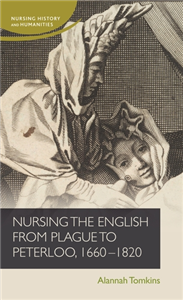Your Search Results
-
Aelurus Publishing / Impress Books
An independent publishing house with a small but passionate team, newly focused on the voices of the marginalised.
View Rights Portal
-
Promoted ContentBusiness, Economics & LawJuly 2025
Medical care, humanitarianism and intimacy in the long Second World War, 1931-1953
by Marie-Luce Desgrandchamps, Laure Humbert, Bertrand Taithe, Raphaële Balu
This book offers a micro-global history of humanitarianism and medical care during the 'long' Second World War, which challenges the traditional and Eurocentric chronological boundaries of 1939/1945. It takes as its starting point the Japanese invasion of Manchuria in 1931, which led to the progressive dislocation of the League of Nations, with the Japanese, German and Soviet departures in the 1930s. It ends with the termination of the Korean War in 1953, and the subsequent dismantlement of the first United Coalition and UN Peace enforcement operation. It considers the slow, messy and ambivalent transformation of humanitarian actors' relations to the suffering of distant others through a study of humanitarian encounters, practices, spaces and affects. Paying close attention to a variety of actors, such as French colonial doctors, Swiss ICRC delegates, Egyptian relief workers, Chinese-style physicians, Peruvian and Ecuadorian nurses or American member of the Unitarian Service Committee, the book provides a more holistic story of humanitarianism.
-
Promoted ContentHumanities & Social SciencesJanuary 2026
United States and Chinese foreign assistance and diplomacy
Aid for dominance
by Salvador Santino Regilme, Obert Hodzi
Aid for Dominance addresses the analytic weaknesses of mainstream analysis of foreign aid, which often focuses on its material dimensions. The book underscores the constitutive relationship between foreign aid as a material resource and the diplomatic discourses and practices that constitute complex bilateral relations between donor and recipient states. Written by two leading scholars of contemporary United States and Chinese foreign policies in the Global South, Aid for Dominance offers a pioneering, theoretically conscious, and empirically rich account of the two great powers' grand strategies in the global development sector. By deploying a multidisciplinary and comparative analysis, this book draws from a wide range of evidentiary materials from primary sources, including data from fieldwork interviews, government documents, local and international newspapers, speeches by high-ranking government officials and diplomats, and secondary data from scholarly publications and policy papers.
-
 Trusted Partner
Psychiatry
Trusted Partner
PsychiatryIntoduction to Affect Phobia Therapy
by Dr. Quin van Dam
A fear of one’s own emotions can lead people to develop what has been termed emotion- or affect phobia. To deal with this specific kind of phobia, Affect Phobia Therapy (APT) has proven to be useful. In APT, psychodynamic, cognitive behavioral, and experimental techniques are combined to help the patient to learn to accept and manage emotions again. Research shows that especially people suffering from anxiety or depression and people with avoidant or dependent personality disorders benefit from this method. This book offers a practical explanation of this evidence-based therapeutic method. The eight chapters focus on all different aspects of APT and the underlying theoretical concepts are illustrated with example patient-therapist dialogues. Target Group: psychologists, psychotherapists, students
-
 Trusted Partner
2023
Trusted Partner
2023Drug Products in Nursing and Care Practice
Safe handling of medication
by Dr. Ulrich Räth and Friedhelm Kamann
The assessment of nursing and care needs and the organisation and quality assurance of nursing care are key tasks performed by nursing staff. This also includes administering medication, something which requires sound organisation, control, implementation and documentation. Nurses observe whether medication is taken consistently, has the desired effect, and whether undesirable side effects occur. The drug product as a „special commodity“ – whether in inpatient long-term care, in outpatient care, or in hospital – requires special knowledge concerning - correct storage, - the pharmacological effect, and - appropriate application. This book is geared towards the diseases and symptoms of people requiring nursing or care. All the important facts concerning the use of medicines are presented here in an understandable manner, focusing on the essentials. Numerous illustrations and practical tips provide the link to everyday nursing care. It is the ideal textbook and reference work for nursing and care assistants as well as nursing professionals.
-
 Trusted Partner
Humanities & Social SciencesFebruary 2026
Trusted Partner
Humanities & Social SciencesFebruary 2026AIDS in Soviet Russia
A story of deception, despair and hope
by Rustam Alexander
The first book to tell the shocking story of the AIDS crisis in Soviet Russia. Throughout the 1980s, as the world was grappling with the escalating crisis of AIDS, Soviet Russia continued to deny there was a problem. Arguing that the disease was limited to foreigners and 'immoral' groups, the government failed to take meaningful action, long past the point other countries had begun to recognise the full scale of the threat. In this ground-breaking book, Rustam Alexander tells the story of AIDS in Soviet Russia. Fixated on disinformation, censorship and the persecution of marginalised communities, the Soviet authorities wasted precious time, allowing the epidemic to strike at the very heart of the nation: its children. Yet, despite the government's failure, a number of brave journalists, doctors and nascent gay groups decided to take matters into their own hands and engage in full-fledged AIDS activism. Tracing the political and social response to AIDS in the final years of the Soviet era, Alexander sheds light on the devastating consequences of government inaction. He draws on personal stories, media reports and archival materials to provide a riveting account of the Russian people's fight against AIDS amid the tumultuous transformations of Gorbachev's perestroika.
-
 Trusted Partner
African historyJanuary 2017
Trusted Partner
African historyJanuary 2017Humanitarian aid, genocide and mass killings
Médecins Sans Frontières, the Rwandan experience, 1982–97
by Jean-Hervé Bradol. Series edited by Bertrand Taithe
Throughout the 1990s, Médecins Sans Frontières (MSF) was forced to face the challenges posed by the genocide of Rwandan Tutsis and a succession of outbreaks of political violence in Rwanda and its neighbouring countries. Humanitarian workers were confronted with the execution of almost one million people, tens of thousands of casualties pouring into health centres, the flight of millions of people who had sought refuge in camps and a series of deadly epidemics. Drawing on various hitherto unpublished private and public archives, this book recounts the experiences of the MSF teams working in the field. It is intended for humanitarian aid practitioners, students, journalists and researchers with an interest in genocide and humanitarian studies and the political sociology of international organisations.
-
 Trusted Partner
Humanities & Social SciencesNovember 2025
Trusted Partner
Humanities & Social SciencesNovember 2025Humanitarian mobilisation in Central and Eastern Europe
Local, national, and international perspectives
by Doina Anca Cretu, Michal Frankl
By focusing on aid Central and Eastern Europe, the volume adds to the existent scholarly explorations of modern humanitarianism, its actors and practices. In the twentieth century, aid workers assisted victims of war and earthquakes, delivered food, supported health care, provided childcare, or sheltered refugees. The contributors not only reconstruct these diverse histories and their protagonists, but also bring international, national, and local actors together: from grassroots activists to private associations to state-driven "socialist humanitarians" to large Western aid organizations. In doing so, they challenge the often unidirectional, from West-to-East, and asymmetrical perspective on donor-recipient relationships in humanitarian processes.
-
 Trusted Partner
2022
Trusted Partner
2022Emergencies at the Pharmacy
Deal competently with emergency situations
by Matthias Bastigkeit
In emergency situations, a pharmacy assumes a special importance. Being an easily accessible point of contact, it is called upon to provide help in confused situations and also in those where there is a clear need for first aid. In such serious cases, it is essential to respond quickly and adequately. - How does one recognise an emergency? - How does one proceed? - What is one allowed to do, what must one do? The book provides clear answers to all these questions about emergency scenarios that can occur at a pharmacy. Whether it is an attack of asthma, a heart attack, burns or poisoning – in future, one will know what to do. In addition, the book provides information about the actions of the emergency physician and the common drugs used in emergencies.
-
 Trusted Partner
Humanities & Social SciencesJune 2021
Trusted Partner
Humanities & Social SciencesJune 2021Feeling the strain
A cultural history of stress in twentieth-century Britain
by Jill Kirby
Examining the popular discourse of nerves and stress, this book provides a historical account of how ordinary Britons understood, explained and coped with the pressures and strains of daily life during the twentieth century. It traces the popular, vernacular discourse of stress, illuminating not just how stress was known, but the ways in which that knowledge was produced. Taking a cultural approach, the book focuses on contemporary popular understandings, revealing continuity of ideas about work, mental health, status, gender and individual weakness, as well as the changing socio-economic contexts that enabled stress to become a ubiquitous condition of everyday life by the end of the century. With accounts from sufferers, families and colleagues it also offers insight into self-help literature, the meanings of work and changing dynamics of domestic life, delivering a complementary perspective to medical histories of stress.
-
 Trusted Partner
Trusted Partner
-
 Trusted Partner
PsychologyApril 2018
Trusted Partner
PsychologyApril 2018What is “Good” Dementia Care?
by Christoph Held
People with dementia experience their condition as a big change in which, for example, new events are not linked to existing experiences and wishes, thoughts, and actions can no longer be connected to each other. This kind of experience of the self, due to the intergative function of the brainbeing temporarily or permanently lost, is called dissociative self-experience. Based on this understanding of dementia, the author develops an approach to effectively understand and support people with dementia in everyday activities. Typical everyday situations and behaviours are presented and reflected on in a practical context.
-
 Trusted Partner
Humanities & Social SciencesJanuary 2013
Trusted Partner
Humanities & Social SciencesJanuary 2013The Black Death
by Rosemary Horrox
This series provides texts central to medieval studies courses and focuses upon the diverse cultural, social and political conditions that affected the functioning of all levels of medieval society. Translations are accompanied by introductory and explanatory material and each volume includes a comprehensive guide to the sources' interpretation, including discussion of critical linguistic problems and an assessment of recent research on the topics covered. From 1348 to 1350 Europe was devastated by an epidemic that left between a third and one half of the population dead. This source book traces, through contemporary writings, the calamitous impact of the Black Death in Europe, with a particular emphasis on its spread across England from 1348 to 1349. Rosemary Horrox surveys contemporary attempts to explain the plague, which was universally regarded as an expression of divine vengeance for the sins of humankind. Moralists all had their particular targets for criticism. However, this emphasis on divine chastisement did not preclude attempts to explain the plague in medical or scientific terms. Also, there was a widespread belief that human agencies had been involved, and such scapegoats as foreigners, the poor and Jews were all accused of poisoning wells. The final section of the book charts the social and psychological impact of the plague, and its effect on the late-medieval economy.
-
 Trusted Partner
Humanities & Social SciencesJune 2024
Trusted Partner
Humanities & Social SciencesJune 2024Birth controlled
Selective reproduction and neoliberal eugenics in South Africa and India
by Amrita Pande
This book analyses the world of selective reproduction by a critical analysis of three modes of controlling birth, namely contraception, reproductive violence, and repro-genetic technologies. All population control policies target and vilify women (Black women in particular), and coerce them into subjecting their bodies to state and medical surveillance; Birth controlled argues that assisted reproductive technologies and repro-genetic technologies employ a similar and stratified burden of blame and responsibility based on gender, race, class and caste. The book draws on gender studies, sociology, medical anthropology, politics, science and technology studies, theology, public health and epidemiology to provides a critical, interdisciplinary and cutting-edge dialogue around the interconnected issues that shape reproductive politics in an ostensibly 'post-population control' era.
-
 Trusted Partner
MedicineAugust 2016
Trusted Partner
MedicineAugust 2016Evidence-based Nursing and Caring
by Johann Behrens, Gero Langer
Evidence-based-nursing and caring, a method that relies on scientifically verifiable data from an outside perspective (“external evidence”) as well as the individual needs of those cared for as well as the caretakers (“internal evidence”). This title offers a detailed insight into external and internal evidence in nursing care and shows in a 6-step-approach how to • make shared decision • analyse and describe problems • find literature and relevant studies • critically evaluate nursing studies and their quality • change nursing practice and • evaluate nursing care. Target Group: Nursing Students, Nurse Educators.
-
 Trusted Partner
Humanities & Social SciencesJune 2024
Trusted Partner
Humanities & Social SciencesJune 2024Politicising and gendering care for older people
Multidisciplinary perspectives from Europe
by Anca Dohotariu, Ana Paula Gil, Lubica Volanská
This book offers a new critical framework for understanding the processes of politicising and gendering care for older people and their manifestations in several European contexts. It interrogates how care for older adults varies across time and place while searching for an in-depth comprehension of how it becomes an arena of political struggle and the object of public policy in different countries and at various societal and political levels. It brings together multidisciplinary contributions that examine the issue of care for older people as a political concern from many angles, such as problematising care needs, long-term care policies, home care services, institutional services and family care. The contributions reveal the diversity of situations in which the processes of politicising and gendering care for older adults overlap, contradict or reinforce each other while leading to increased gender (in)equalities on different levels.
-
 Trusted Partner
Teaching, Language & ReferenceAugust 2024
Trusted Partner
Teaching, Language & ReferenceAugust 2024Aid to Armenia
Humanitarianism and intervention from the 1890s to the present
by Joanne Laycock, Francesca Piana
Interventions on behalf of Armenia and Armenians have come to be identified by scholars and practitioners alike as defining moments in the history of humanitarianism. This book reassesses these claims, critically examining a range of interventions by governments, international and diasporic organizations, and individuals that aimed to 'save Armenians'. Drawing on multidisciplinary perspectives, it traces the evolution of these interventions from the late-nineteenth century to the present day, paying particular attention to the aftermaths of the genocide and the upheavals of the post-Soviet period. The contributions connect diverse places (the Caucasus, Russia, the Middle East, Europe, North America, South America, and Australia) to reveal shifting transnational networks of aid and intervention. Aid to Armenia explores this history, and engages critically with contemporary humanitarian questions facing Armenia, the South Caucasus region and the wider diaspora.
-
 Trusted Partner
Trusted Partner
-
 Trusted Partner
Humanities & Social SciencesMay 2024
Trusted Partner
Humanities & Social SciencesMay 2024Out of his mind
Masculinity and mental illness in Victorian Britain
by Amy Milne-Smith
Out of His Mind interrogates how Victorians made sense of the madman as both a social reality and a cultural representation. Even at the height of enthusiasm for the curative powers of nineteenth-century psychiatry, to be certified as a lunatic meant a loss of one's freedom and in many ways one's identify. Because men had the most power and authority in Victorian Britain, this also meant they had the most to lose. The madman was often a marginal figure, confined in private homes, hospitals, and asylums. Yet as a cultural phenomenon he loomed large, tapping into broader social anxieties about respectability, masculine self-control, and fears of degeneration. Using a wealth of case notes, press accounts, literature, medical and government reports, this text provides a rich window into public understandings and personal experiences of men's insanity.
-
 Trusted Partner
Trusted Partner
Work & Care – The Path to Compatibility Competence
Reconciling Work and Caring for Family Members
by Iren Bischofberger
The book focuses on people who, in addition to their gainful employment, are also responsible for caring for sick, impaired, or very old relatives - in other words, “work & care”. This topic is at the intersection of two scarce resources - the private unpaid care potential for loved ones on the one hand and the employment potential of family members on the other. The author examines what the professional, operational, and political consequences are for nursing science and practice as well as for service providers and payers. She makes suggestions for the development of personal, family, and organizational compatibility competence on the levels of action time-out and regeneration, knowledge and empowerment, coordination and organization, exchange and accompaniment. Finally, she offers options for action for nursing science and sheds light on the field of activity of scientific policy advice.
-
 Trusted Partner
MedicineJanuary 2025
Trusted Partner
MedicineJanuary 2025Nursing the English from plague to Peterloo, 1665-1820
by Alannah Tomkins
This book studies the negative stereotypes around the women who worked as sick nurses in this period and contrasts them with the lived experience of both domestic and institutional nursing staff. Furthermore, it integrates nursing by men into the broader history of care as a constant if little-recognised presence. It finds that women and men undertook caring work to the best of their ability, and often performed well, despite multiple threats to nurse reputations on the grounds of gender norms and social status. Chapters consider nursing in the home, in general hospitals, in specialist institutions like the Royal Chelsea Hospital and asylums, plus during wartime, illuminated by multiple accounts of individual nurses. In these settings, it employs the sociological concept of 'dirty work' to contextualise the challenges to nurses and nursing identities.




